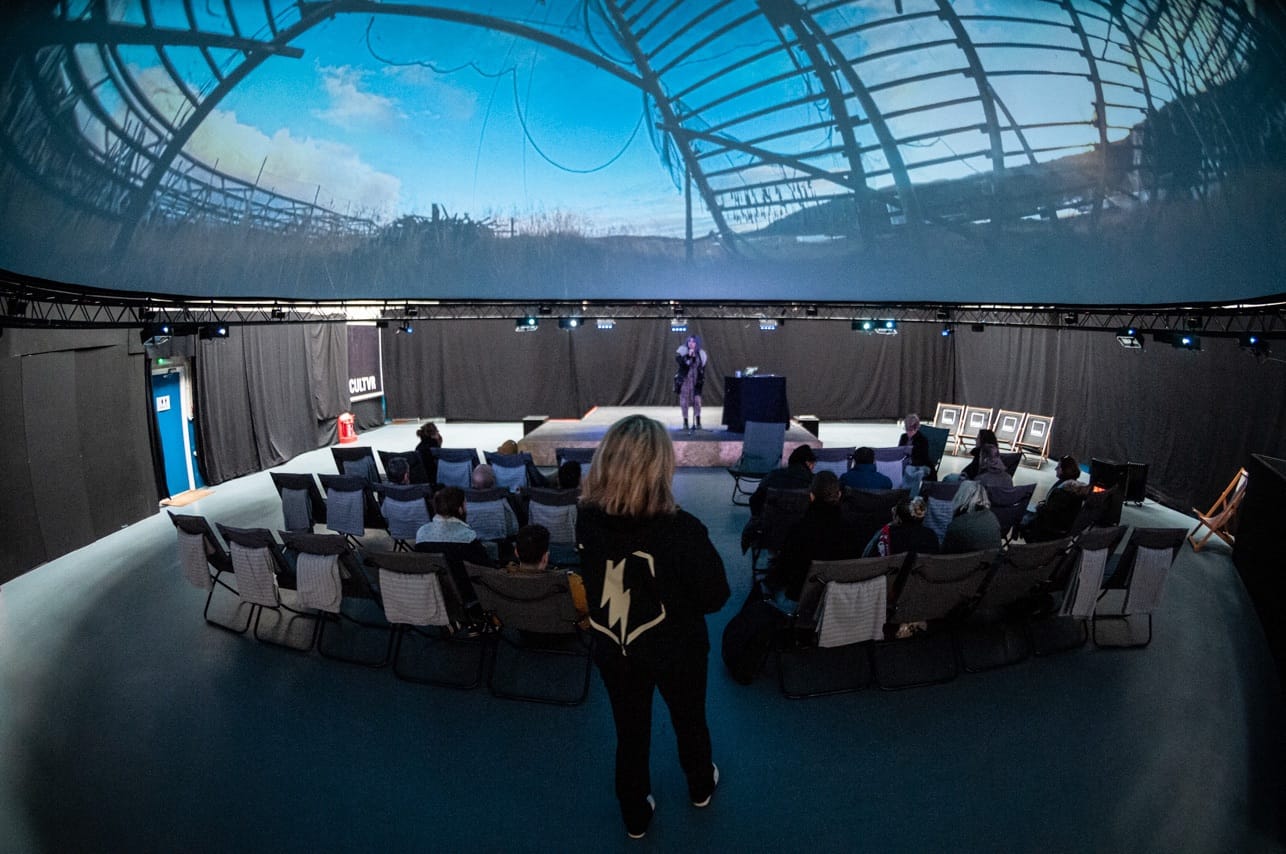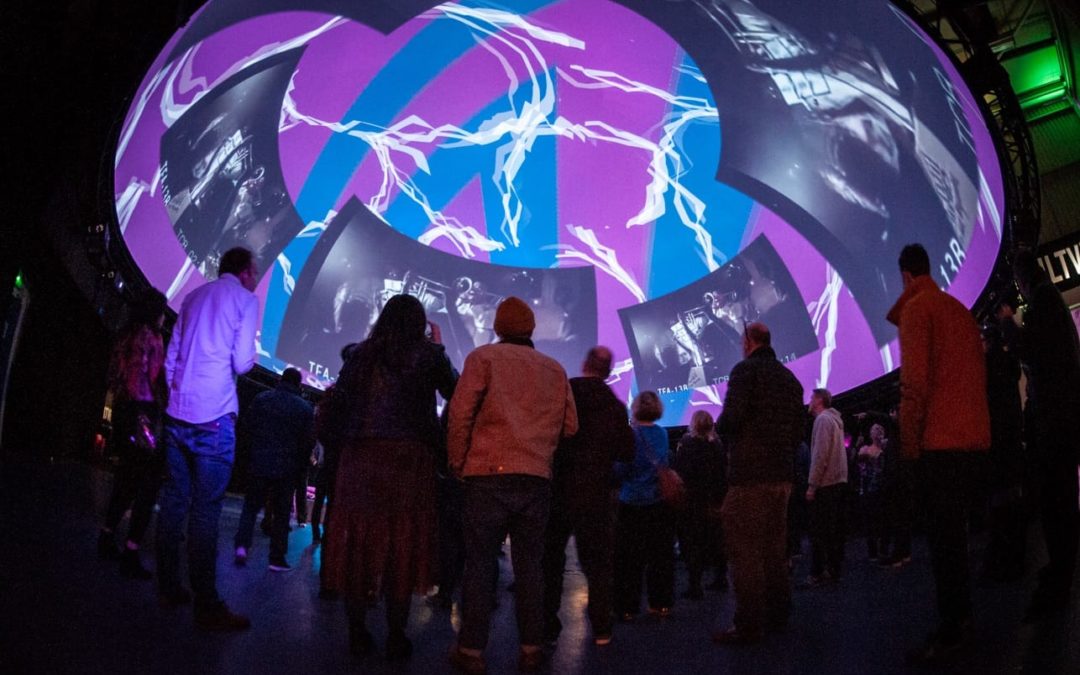Part of the XR Stories cluster, Live Cinema UK is exploring the technology and storytelling skills needed to create and stage engaging narrative content for 360° screens. Working with an initial £30k funding stream they have collaborated on a full dome audio visual show with AV artist DJ Yoda, running a pilot dome at the Glasgow Film Festival and at the National Science and Media Museum, Bradford, and gathering insights along the way into what makes a great audience experience. Live Cinema UK founder and director Lisa Brook told us more.
Where did the idea come from?
Live Cinema UK’s remit is to create collective audience experiences in the age of video on demand. The team saw an opportunity to create more cultural content for a new generation of 360° screens. Traditionally, 360° content has only been shown in planetariums and has been, therefore, very science-focused. Live Cinema UK believes there is an opportunity to develop rich cultural, narrative content.
How has the idea developed?
Live Cinema UK conducted a feasibility study with funding from UKRI’s Audience of the Future Challenge to look at current and potential uses of headset-free virtual reality (VR) spaces and the availability of content. This was followed by funding from XR Stories to set up the Surround Stories pilot. Storytellers from different media attended workshops to create new audio/visual immersive work for a showcase event – unfortunately this had to be postponed due to COVID19. The work included a 360° full dome audio visual (AV) show by DJ and AV artist DJ Yoda and the development of new techniques by full dome artists Emily Briselden-Waters and Alice Kilkenny to visualise audio captured in real time.
XR Stories awarded Live Cinema UK a second grant in July 2020, which it will use to set up the Surround Stories Lab in Leeds. The Lab endeavours to create a wider network of artists and to provide them with technical training on how to make content for 360° screens. The Lab will commission and fund new works, including an interactive piece by Michaela French, founder of the Full Dome Research Group at the Royal Academy of Arts. It will also work internationally to support the distribution of cultural 360° works.

Who is the audience?
The project aims to engage people who wouldn’t normally visit a planetarium but are interested in immersive, interactive experiences. They would most likely be a younger audience who want to experience something tangible and shareable.
Live Cinema UK has run successful pilots at temporary domes at the Glasgow Film Festival and the National Science and Media Museum in Bradford. The domes screened a mix of content, including travel, music, archive film and digital art, plus repurposed widescreen and Cinerama content. For example, audiences experienced a 360° drone fly-through of Hamburg harbour, 360° music videos from Squarepusher and Muse, whose video was mapped for 360° screens for the first time, and a new piece called ‘Scottish Women on Film’ which uses footage from the National Library of Scotland that was also mapped for 360° use for the first time.
What have Live Cinema UK discovered about audiences?
Live Cinema UK surveyed audiences on exit, finding that feedback was positive and pointed towards a level of high interest in the prospect of seeing more quality content. The digital art sessions sold out in advance. Seating and comfort had a big impact on people’s experience and audiences are very canny about quality of content and projection. Although digital natives can access a huge array of content at any time on their devices, content that can only be experienced in collective environments will still get their attention. Live Cinema UK is exploring options unique to these environments such as audience-controlled content that reacts to audience movement and sounds.
How did Live Cinema UK find out about XR Stories and what funding have they provided?
Live Cinema UK discovered XR Stories while working with Audience of the Future on the initial feasibility study. XR Stories has since provided two rounds of funding, the first for £30,000.
How else is XR Stories supporting the work?
While there are two other full dome experiences – in Montreal, Canada, and Cardiff, Wales – Live Cinema UK’s work is unique in that it has partnered with technology from the University of Leeds, University of Nottingham and King’s College London since 2015. They are now working together with the new Centre for Immersive Tech based in Leeds to place full dome and 360° experiences in their development.
XR Stories is also helping Live Cinema UK identify other sources of funding, advising on business development and encouraging the team to collaborate with other organisations across the region.
What are the challenges involved?
Immersive dome content is typically made for planetariums using high resolution flat images projected at a high frame rate. This is different from the way in which a film or immersive work are projected and there’s a lack of knowledge among artists and filmmakers about the 360° format. What’s more, planetariums have busy school and family programmes, making it difficult for them to provide access to artists to develop work. Surround Stories Lab will aim to provide that access and introduce the format to artists from different areas to help them create new work. Live Cinema UK is also working with the world’s second permanent dome in Cardiff to learn more about the challenges.
What impact has the COVID19 pandemic had?
The team is rethinking capacity inside domes and will limit audience numbers to around six during screenings planned in November 2020. However, COVID19 may introduce opportunities to attract new audiences since dome content is short-form – around 30 minutes – which means seating can be easily adapted and you can enjoy a cinema experience without the worry of spending too long in one space.
What is the business model?
Live Cinema UK has a public funding background and is currently working on its business model with mentors from RTC North, thanks to an introduction from Innovate UK, which supports the Survive-Stabilise-Grow programme.
What are the measures of success?
At the moment Live Cinema UK uses a small portable dome, but its goal is to open a permanent space dome in the Leeds city region that would become a multi-purpose immersive venue and research facility. The team is now in discussions with its partners at University of Leeds about where and how to site a dome and hope to open a space in the next 12-18 months. A longer-term goal is to see new immersive work recognised internationally at film festivals and 360° cinema becoming an integral part of the cinema sector.

